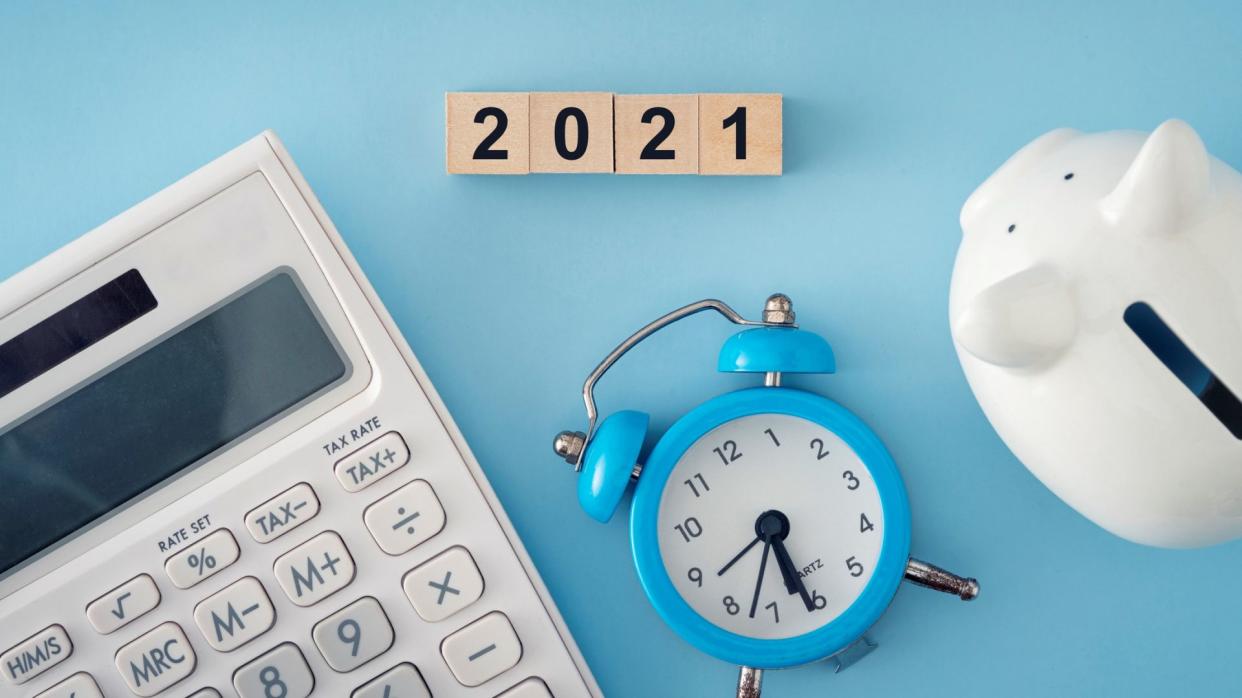The Top 5 Things To Do With Your Money the Rest of 2021

We’ve made it through the first half of what felt like a truly unpredictable year. Following a period of intense volatility due to a global pandemic, financial priorities had to be restructured. Now that we’re returning back to work and know what to expect day-to-day and paycheck-to-paycheck, it’s time to take another look at our bank accounts, and decide what the best financial moves are going forward. GOBankingRates spoke with investment experts for advice on how best to spend — or save — your cash in the remaining months of 2021.
Find Out: Budgeting 101: How To Create a Budget You Can Live With
Learn More: 50 Ways To Live the Big Life on a Small Budget
Prioritize Professional Development
After seeing how quickly jobs can disappear, it’s time to take stock of your career and determine if it’s worth fighting for. If you love your job, find ways you can become better at it and enhance your skill set so, in the event of another shutdown, you have the most leverage to use when defending the need for your position.
“Investing in your future and professional development is the most prudent thing you can do at this time,” Adem Selita, Founder and CEO of The Debt Relief Company, advised. “You might not see an instant return on your investment but when things inevitably change (and they may change very fast), you will be that much more prepared than the rest of your peers.”
Selita recommended taking classes relevant to your field so you can learn new and valuable skills.
Career Change? The World’s Most In-Demand Jobs That Don’t Require a Degree
Pay Off Debt
If you’re carrying any debt and are in a more financially stable place this year than you were last year, think about paying as much off as you can as soon as possible. Reducing and possibly eliminating the amount that you owe while you have some extra money puts you in a more secure position if hard times were to strike again. It also sets you up for more success in buying a car or home in the future.
Amber Morland, the CEO and Founder of WinCope suggested also considering debt consolidation plans. “Consolidating your debt decreases the number of payments you have to think about each month while also lowering the amount of interest you pay over the course of the loan’s life,” Morland said. “Consider transferring your debt to a zero-percent balance transfer credit card if you’re battling with high-interest debt. Balance transfer cards are normally numerous when interest rates are extremely low”
These Perks Are Worth It : 10 Credit Cards To Consider for Travel Rewards
Diversify Investments
If you don’t have any debt, start looking for profitable avenues in which you can invest your money. Alli Williams, CEO and Founder of FinanciALLI Focused, assured that even $25 or $50 a month can make a big difference.
“Don’t focus so much on the amount, but building the habit,” Williams said. “You can open a Roth IRA and invest in low cost index funds or you could contribute to your employer sponsored 401K. The important thing is to start now.”
As far as 401Ks go, Eden Cheng, the Co-Founder of PeopleFinderFree, suggests raising whatever you’re contributing now by at least 1%, saying “Investing even a few additional bucks a month can double the amounts [you’ll earn] at the end of the month,” Cheng said.
Investing for Beginners: What First-Time Investors Need To Know
Save What You Can
It’s always prudent to save in case emergency strikes, especially after last year’s events. “2020 was a very volatile financial year and you need to be prepared,” Williams warned. Experts recommend saving 3 months worth of expenses. “If you already saved 1-3 months of expenses in an emergency fund, are debt free, and on track with your other savings goals then you should increase your emergency fund to 3-6 months of expenses,” Williams said.
To get the most bang for your buck, Williams recommended moving your savings cash to a high yield savings account. “The average interest rate for a traditional bank is .02% and the average interest rate for a high yield savings account is 0.5%.” Williams said. “There is no added risk for using a HYSA over a traditional bank, and your money can make more money.”
Avoid: 50 Terrible Ways To Try and Save Money
Don’t Forget to Treat Yourself
Getting back on track doesn’t mean giving into the grind. Part of the beauty of saving money means you can have fun without worrying about finances. Financial Wellness Educator Danetha Doe said taking a vacation is crucial to relieve stress, and for a higher quality of life.
“Many folks are experiencing mental fatigue and burnout from their careers. Chronic burnout is stressful on the body and mind, and can lead to severe physical issues,” Doe cautioned. But burnout can be alleviated by taking time to relax with a trip or a staycation. “Money is a tool to be used to enjoy life, so use your money to experience the joy that life has to offer.”
More From GOBankingRates
This article originally appeared on GOBankingRates.com: The Top 5 Things To Do With Your Money the Rest of 2021
